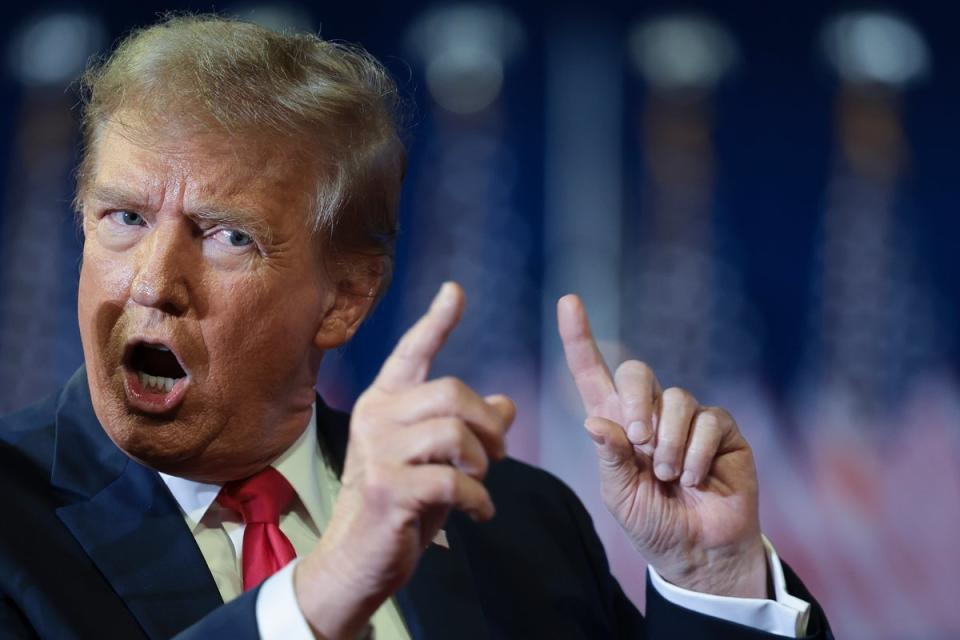Trump calls on Supreme Court to block ruling against ‘immunity’ defence on election conspiracy charges
Donald Trump is asking the US Supreme Court to block a ruling that struck down his “immunity” defence against prosecution for crimes allegedly committed while he was in office, potentially setting up another major constitutional question involving the former president’s campaign in front of the nation’s highest court.
On Monday, Mr Trump’s attorneys filed their expected request following last week’s appellate court ruling that rejected his “immunity” from charges connected to his attempts to overturn the 2020 presidential election.
“This threat will hang like a millstone around every future President’s neck, distorting Presidential decisionmaking, undermining the President’s independence, and clouding the President’s ability ‘to deal fearlessly and impartially with’ the duties of his office,’” according to Mr Trump’s attorneys.
“Without immunity from criminal prosecution, the Presidency as we know it will cease to exist,” they wrote.
Mr Trump is asking the justices to block the appeals court ruling from taking effect while he prepares to file a case tackling that decision before the Supreme Court.
His filing also requests the justices to block the ruling while he prepares to take another stab at arguing his “immunity” in front of a full panel of appeals court judges.
The request comes days after Mr Trump’s legal team argued in front of the justices for a separate case, one that challenges a Colorado court ruling that disqualifies him from 2024 ballots.
His attorneys could be headed right back to the nation’s high court relatively swiftly if the justices agree to hear the “immunity” question, smack in the middle of a primary election calendar and Mr Trump’s busy schedule of multiple criminal and civil cases.
Progress in the election conspiracy case under special counsel Jack Smith has effectively been ground to a halt with Mr Trump’s ongoing appeal of a central question in the case, one that has so far been shot down at both the appeals court and by the federal judge overseeing the case.
In their unanimous rebuke last week, appeals court judges wrote that “citizen Trump” is not shielded by executive immunity, and that his “alleged efforts to remain in power despite losing the 2020 election were, if proven, an unprecedented assault on the structure of our government.”
The 57-page ruling delivered an outright rejection of his premise that a president has “unbounded authority to commit crimes that would neutralise the most fundamental check on executive power – the recognition and implementation of election results”, as well as his “carte blanche” efforts “to violate the rights of individual citizens to vote and to have their votes count”.
“We cannot accept that the office of the presidency places its former occupants above the law for all time thereafter,” they added.

In December, US District Judge Tanya Chutkan rejected Mr Trump’s motion to dismiss the case on “immunity” grounds, writing in a 48-page ruling that his four-year term “did not bestow on him the divine right of kings to evade the criminal accountability that governs his fellow citizens”.
The office of the presidency “does not confer a lifelong ‘get-out-of-jail-free’ pass”, nor do former presidents enjoy any special consideration after leaving office, when they are “subject to federal investigation, indictment, prosecution, conviction, and punishment for any criminal acts undertaken while in office,” she wrote.
In their Supreme Court filing on Monday, attorneys for Mr Trump claimed that a months-long criminal trial on election interference charges “at the height of election season” will “radically disrupt” his campaign against President Joe Biden, and gestured at Mr Trump’s conspiracy that investigations into the former president are part of a Democratic-led conspiracy against him.
Disrupting the campaign “appears to be whole point of the Special Counsel’s persistent demands for expedition,” according to Mr Trump’s legal team.


